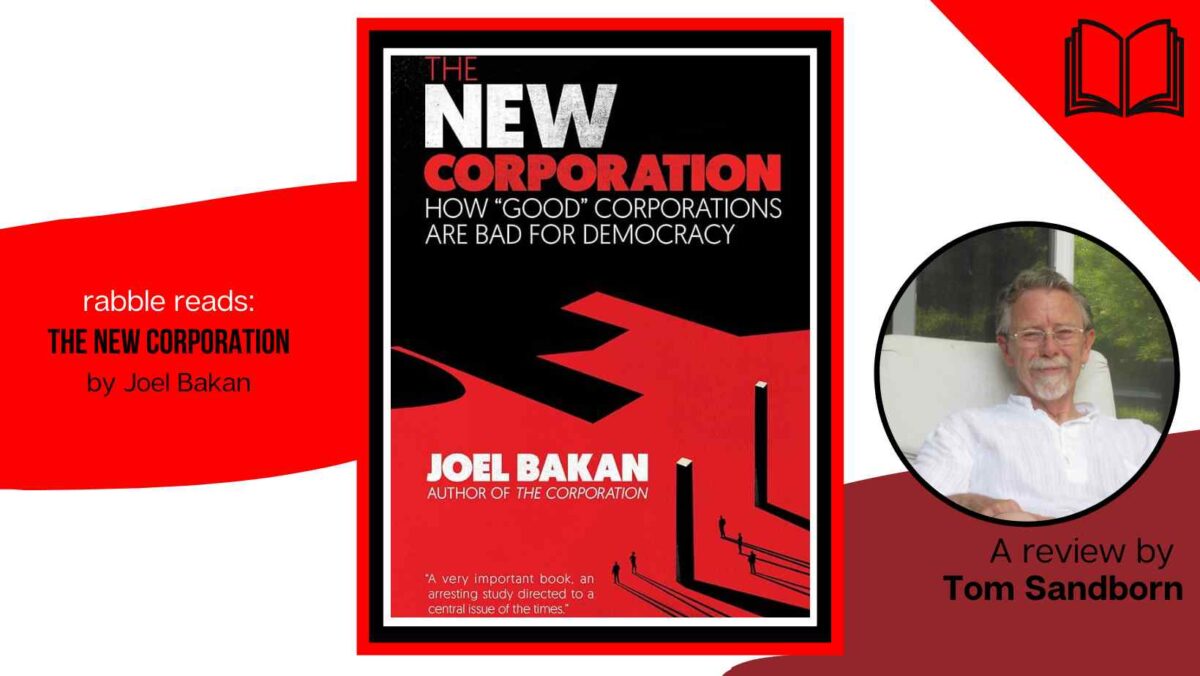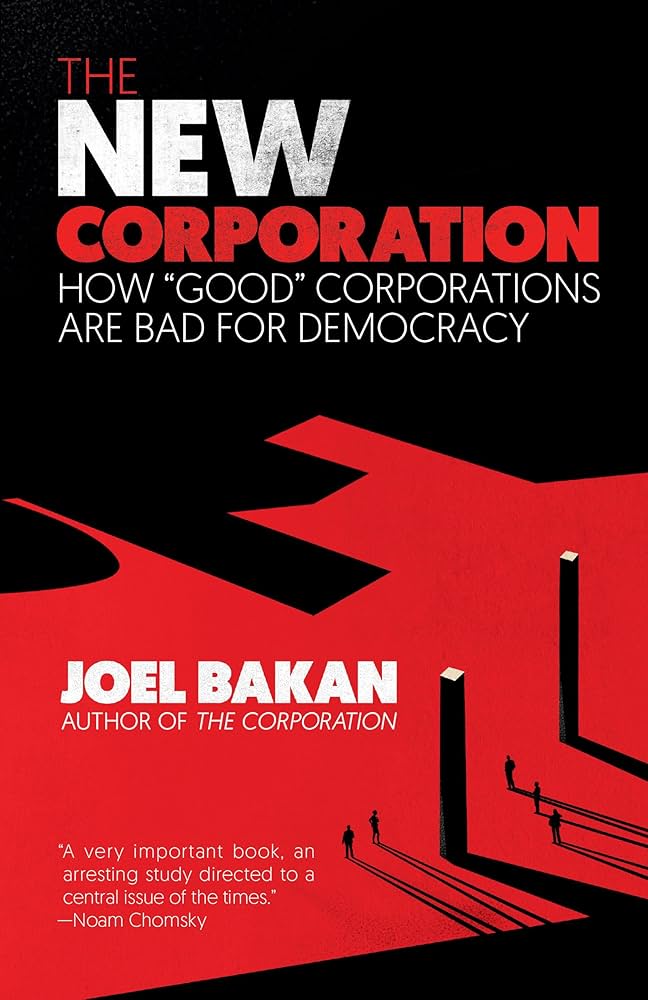For over two decades now, University of BC law school prof Joel Bakan has been sounding the alarm. In his 2003 book The Corporation and his follow up in 2020, The New Corporation, (and in the successful movies based on the two books) Bakan has warned us that the limited liability corporation, an odd 19th century invention that pretends that companies are people and deserve the same recognition and protection that people do before the law, is an evil entity, a psychopathic personality with no conscience and a shark that never rests in its endless killing, eating and defecating.
In The New Corporation Bakan argues that claims of corporate social responsibility and leadership in improving the world are essentially hypocritical pretenses, masking the ongoing and sharklike behavior.
While some critics dismiss Bakan and his work as “not as radical as it thinks it is,” the law prof’s oeuvre is an important contribution to our current debates about class, business and the uncertain future.
Now, half a decade after The New Corporation appeared and in the long orange rain shadow of the current globalized upsurge of neo-fascism, is a good time to revisit Bakan’s 2020 book and the lessons it can teach us. Even though US President Donald Trump and his global allies see no need to pretend, as Bakan’s “new corporations” did, that they represent a path to social justice and a better life for all, progressives and labour activists can learn a lot from this work. It places the discourse about the “dangers of woke corporations” so popular in some circles currently, in context, and reminds us of just how swiftly things are changing. A half a decade on, the masks are off and many of the “new corporations” described by Bakan are hurrying to kiss Trump’s ring and line up behind him.
Turns out the new boss is very much like the old boss. Whether big corporations and the politicians they control nod toward human decency or baldly express the greed and inhumanity at their core, the sharks remain sharks, and they will eat us if we don’t organize to stop their rampages .
In the second decade of the 21st century, many corporations seemed to have adopted Oscar Wilde’s wonderful epigram, “Hypocrisy is the tribute vice pays to virtue” as an element of their business plans. While still committed to increasing corporate profits and shareholder gains as core to their identities and practice, these “new corporations” purported to have found a new role as promoters of social change and reform. There was little reflection on the conflict between the old and foundational goal of maximizing profit and the newly proclaimed commitment.
For example, Bakan tells us that in 2019 the Business Roundtable, led by JP Morgan’s Jamie Dimon “… heralded a new age of corporate capitalism. Henceforth, the CEOs proclaimed, the purpose of publicly traded corporations would be to serve the interests of not only of shareholders but also of workers, communities and the environment.” Fat chance, but the public virtue signalling seemed timely to the elements of the ruling class represented by Dimon, and was proclaimed with great fanfare.
Bakan’s book about what he called “the new corporation” movement, opens with snapshots of Dimon and other exponents of this essentially duplicitous movement at the Davos World Economic Forum. Bakan cites Klaus Schwab, the founder of the annual Davos event as the inventor of the arguably oxymoronic phrase “stakeholder capitalism” to promote his claim that capitalism could be reformed, not by regulation or revolution, but by shareholders changing their minds and priorities to include the social and environmental concerns of stakeholders beyond shareholders.
Like many members of his class, Dimon presented himself as an opponent of Trump then. In 2017 He told bank staff: “Constructive economic and regulatory policies are not enough and will not matter if we do not address the divisions in our country. It is a leader’s role, in business or government, to bring people together, not tear them apart.”
But in January 2024 Dimon said the Republican was “kind of right” about NATO and immigration, adding: “He grew the economy quite well. Trade tax reform worked. He was right about some of China.” According to a staff memo seen by Reuters after Trump’s victory, Dimon congratulated him, incoming Vice President JD Vance, and other elected representatives. t
And Dimon was acting as an informal economic advisor to Trump in the fall of 2024, according to The Telegraph helping His Orangeness “on plans for cutting government spending, bank regulation, taxes and trade policy.”
Elon Musk, another corporate titan who originally opposed Trump until he didn’t, saying in 2016 that “He is not the right guy. He doesn’t seem to have the sort of character that reflects well on the United States,” seems to be doing most of the heavy lifting on these DOGE ball, agency gutting policy changes currently, but Dimon and other corporate enablers are cheering in the background. Included in the rogue’s gallery of “new corporation” leaders who have abandoned any critical perspective on Trump and signed up for the new age of corporate rapacity are Jeff Bezos (Amazon, Washington Post), Mark Zuckerberg (Meta), Bob Iger (Disney, ABC News), and Sundar Pichai (Google).
The era of the “woke” corporation and stakeholder capitalism, as portrayed in Bakan’s book, is rapidly ending. Maybe workers and their allies will be more skeptical when the next version of “capitalism is good for you” BS is rolled out, and Bakan’s book is a valuable reminder of why we shouldn’t be fooled again.




